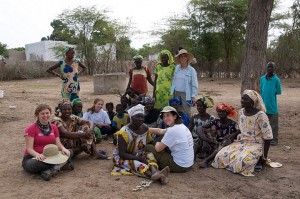
Senegal
Sunday in June
A young girl, fifteen, takes my hand and leads me to her house. “Baila” she says. Baila means dance in Spanish, a language I do understand. She is, however, speaking Wolof. She hands me a broom made out of sticks, with no handle and I understand that Baila means sweep in Wolof. She motions to me in a gesture saying, “Sweep my house.” Then I imagine the translation of the stream of words in Wolof: “I live here with my parents and seven or eight brothers. You came to help. We need the house to be cleaned so get started. I will show you how.” She has the smooth skin of youth, the color of bittersweet chocolate. She is wearing an orange nylon tee-shirt and a long cotton skirt with swirling lines of green and blue. It is tied at her waist. No shoes.
I take the broom and start to sweep. She frowns and shows me again. “Use the side of the twigs,” she says in Wolof as far as I know. She is moderately impatient with me. I smile weakly and try again.
The floor is dirt plastered over. There are a lot of holes and cracks where sand collects. It is Senegal, the Sahel. The soil is dry. Dust is everywhere. The desert is encroaching daily. “Baila” Somehow I understand the young girl’s name is Hilda or Hulda. She is insistent, directive but not mean with me. I am older than her grandmother by a few years I judge. I am ok with it all.Continue Reading